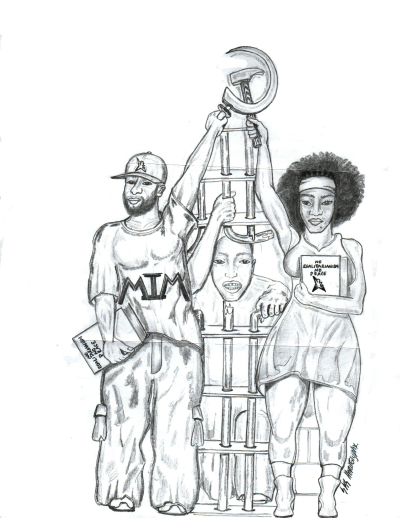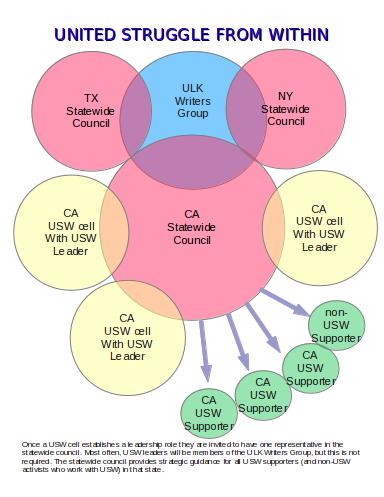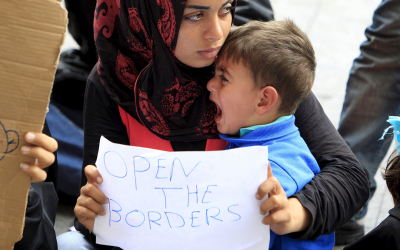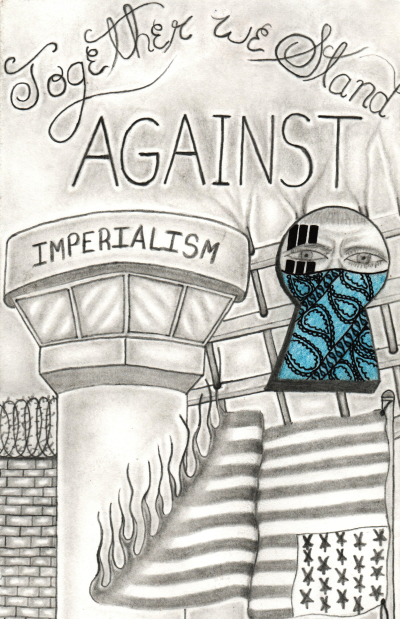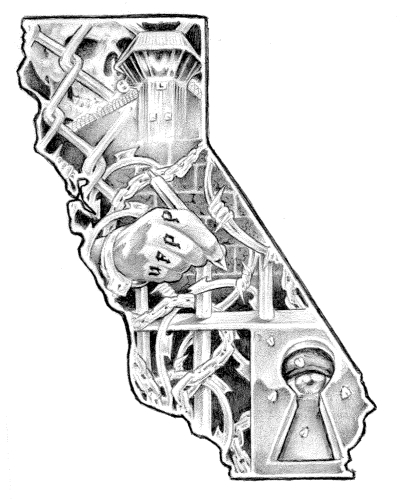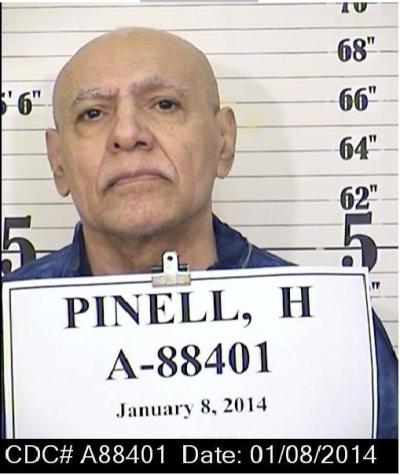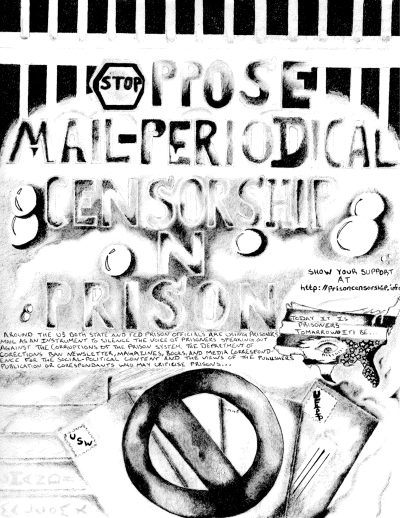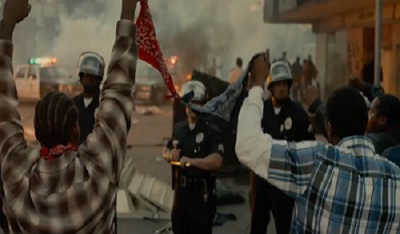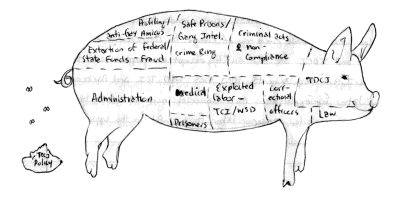
Initial Report from September 9 Day of Peace and Solidarity
9 September 2015 marked the fourth annual Day of Peace and Solidarity in prisons throughout the United $tates. This is an opportunity for us to commemorate the anniversary of the Attica uprising and draw attention to abuse of prisoners across the country. The demonstration was initiated in 2012 by an organization participating in United Front for Peace in Prisons (UFPP) and has been taken up as an annual UFPP event, with people committing to participate in prisons across the country. Activities vary, from peaceful resistance and fasting to study groups and educational events. Some observe the event alone due to their confinement conditions and some take this opportunity to organize with others.
This demonstration is focused on the UFPP principles of peace and unity: We organize to end the needless conflicts and violence among prisoners, and we strive to unite with those who have a common interest in fighting the oppression of the criminal injustice system. On this one day we call on all prisoners to take up these principles and cease all prisoner-on-prisoner hostilities, and use the day for solidarity building and education.
While we don’t organize for just one day of peace and unity, this day of action expands awareness and broadens our base of support to build for peace and unity year round. In this way we build from smaller campaigns to broader goals and ultimately to a movement that can stand up against the entire criminal injustice system.
We have already received reports from a number of September 9 participants, which are summarized here. Look for more reports in upcoming issues of Under Lock & Key.
Comrades in Arkansas commemorated the day by joining USW and committing to stepping up their work in the coming year:
“Happy Day of Peace and Solidarity! Today my comrades and I celebrated by eating a chili spread and discussing the many ailments that plague prisoners as a result of our confinement. We also discussed the ways we might non-coercively combat the prison establishment from within. That is no easy task because at the first sign of unity the pigs are quick to lock us up and separate us. Not that we have much to lose considering we are being housed on administrative segregation (23 hour lock down).“We decided to name our study group CRASH or Crazy Revolutionaries Against Social Hierarchy. We thought it fitting to name ourselves on this day to commemorate Attica. We would also like to join USW. We absolutely agree with all 6 points of MIM(Prisons) and would like to join other like-minded individuals and take a more active role in helping unify the oppressed against imperialism. All power to the people and let burn the renewing flames of the communist revolution!”
In Louisiana a new comrade devoted the day to serious study and fasting:
“I am writing to inform you that because of knowledge I received by reading Under Lock & Key I participated in my first commemoration of the September 9 Day of Peace Peace and Solidarity movement. Six months ago I was unaware such a movement even existed, especially since I was first exposed to the tragedy in, or rather at, Attica in the late 90s - the same time I was first introduced to the Souljah George. The organization I was/am a part of already in our protocols recognized Black August. But the September 9 movement was unknown to us.“Even though I hadn’t heard of the movement I still responded to your call to arms. I fasted from solid food the entire day and only had one cup of water after sundown. I also, after each prayer (as I am a conscious and conscientious Muslim), reread articles from ULK and expounded upon them to my neighbor who, incidentally, is the guy who was involved in the failed judicial lynching attempt of Lil Boosie.
“I also revisited The Wretched of the Earth by Fanon with particular emphasis on the preface written by Jean-Paul Sartre. And although it is a scathing denunciation of European imperialism/colonialism and a concise treatise advocating, or rather understanding, the use of violence to uproot that system, I still believe it was appropriate reading for the commemoration of this day. For as we know, the overall goal you wish to achieve and those I am aligned with will not be a peaceful act in the traditional sense of the word. The forces of capitalism will not go quietly into that good night.”
In Michigan one organizer is spreading information about this history of Attica and the September 9 Day:
“I’ve been talking to a lot of prisoners about the September 9 Day of Peace and Solidarity but a lot of prisoners knew nothing about the Attica uprising by the comrades against the injustice department of corruption of the DOCs across the country. I myself fasted on September 9 for the remembrance of the fallen comrades, but the majority of prisoners in the Michigan DOC played games, watched TV, and talked shit about the ‘new private food services trinity.’ But they aren’t for peace and solidarity.”
While this comrade found most prisoners wasting time, the seeds of discontent are there with their discussions about the food service. These seeds can be nurtured with education and organizing to build a core devoted to peace and solidarity.
A comrade at the California Health Care Facility wrote in advance of the date about plans:
“For September 9 this year my comrades and I are organizing a hunger strike to make the pigs start cleaning our unit. We live in a controlled unit that doesn’t allow porters, leaving the cleaning up to the pigs or custodians. But they never do it so we are forced to live in filth.”
On September 10 we received the following update from this same comrade:
“Update on my September 9 hunger strike. The pigs conceded and cleaned the unit. On top of that I had 15 copies made of the grievance campaign petition and had two comrades join me in flooding the listed offices with them. I provided the postage for them all since they are stingy with the indigent envelopes here. I also led a small group in which we went over the history and importance of September 9 and enlightened a few who were unaware of the struggle. I broke my fast at midnight a few minutes ago so now I’m going to spend some time in contemplation and get some zzz’s.”
Another California comrade wrote about organizing at California Correctional Institution:
“For September 9 I attempted to raise the level of consciousness amongst the inmates here on a few issues:“1) I spoke on comrade George L. Jackson’s untimely death at San Quentin, and his particular struggle transforming the colonial and criminal mind into a revolutionary mentality. I talked about how he vied to unify the blacks and other groups. But, the reactionary system wasn’t having it one bit. So as a result of his struggles in prison he was assassinated.
“2) I also spoke on Hugo Pinell, who was also slain unfortunately during Black August, and what he stood for in terms of solidarity amongst progressive people. I also spoke on Attica’s uprising. Mao said, ‘one spark can light a prairie fire.’ And it definitely did.
“3) I spoke on how it is vitally important to end all hostilities amongst all groups of prisoners and beyond. In spite of the fact that hostilities will be fomented by the reactionary state. We must continue to vie for peace, harmony and love amongst each other no matter what. The enemy will stop at nothing to foil our efforts. It’s part of the struggle to continue moving forward until our goals can be realized, and at that we can set more.
“Also, I spoke to them about the importance of maintaining a study group here even after my departure from prison. And that each and every one of them have an inherent obligation to conduct and maintain a study group amongst themselves so that they can continue raising the social and political consciousness of prisoners as a whole.
“I did what I could to commemorate September 9. The discussion was for 2 hours. It turned out pretty well. Most of the participants didn’t have a clue about these historical events and about the prison movement in general. And of course, some had questions. About 12 people attended the group. Also, I did a thousand burpees myself to commemorate September 9. It was exhilarating and refreshing at 53 years of age, to continue to push forward in my 34th year incarcerated. Pamoja tutashinda uhuru sasa!”
Also from California at High Desert CF we received a preview of September 9 plans from the organization Abolitionist From Within:
“As the leading member of the Abolitionist From Within (AFW) I do support MIM(Prisons) and embrace as a group the five core principles of the United Front for Peace in Prisons. While AFW may not agree with every political issue MIM(Prisons) advocates, it is the issues that we both support that bring us together in this revolutionary struggle. AFW recently had our first demonstration at High Desert State Prison (HDSP), bringing together a cohesive front in reflecting, fasting and uniting to honor those nameless and faceless men of Black August and Attica (1971) by coming together in solidarity. We brought up the issues of the day affecting us and we all offered solutions from each individual’s perspective. It was a beautiful and righteous energy as we synergized, listening to each other, and offered the best of ourselves during this time. We will meet again on September 9 and try to agree on the best solutions in attacking and combating the issues that are inflicting us today from the first meeting.”
These comrades followed up with a report on their September 9 activities:
“It’s been a blessing to learn and grow from each comrade who has engaged in a solidarity demonstration with the movement, Abolitionists From Within (AFW). We came together for all the lost comrades and those that continue to struggle and unite to break the chain of injustice.“We fasted September 8 to September 9 in a show of solidarity. Also we studied together reading books with study questions and we also read material from Under Lock & Key No. 45 and the September 9 Day of Struggle Study Pack. After reading, we came up with questions from the material and off we went back to our cells. We also shared the word with anybody who was willing to listen. Back in our cells i heard the comrades feeling like freedom revolutionary fighters and that’s what’s up! We stand in solidarity with the comrades who fought and died in the uprising at Attica. Continue to struggle with peace on our tongue.
“Here on ‘D yard’ there was nothing but peace today in solidarity with the movement and with the Attica freedom fighters. The movement prevented many young men from being swallowed by the prison culture and that’s how I feel about the MIM(Prisons) movement helping us comrades who want change, so I say stay struggling and thank for your continued struggle with us prisoners. Revolutionary Greetings!”
In California Pelican Bay also represented this September 9,
“Today was a good day. No one had any canteen or nothing to make food, but we had good conversation about Yogi’s death and how it was a benefit to the state. The hunger strike was brought up and I talked about how our hunger strike was a continuation of the struggles of Attica.“It was hard to speak of peace when we are so close to the tragedy at Folsom, but folks here with me want peace; we have all voiced peace and how it helps us all in our own struggles. Doing the state’s bidding by oppressing other prisoners is not coming from anyone housed around me. We know that the real contradiction lies in prisoners vs. the state. Hopefully other circles come to realize this or are weeded out because Attica gave us a concrete example of what us vs. them looks like. So did the San Quentin Six and the California hunger strikes.”




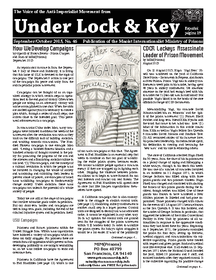
 Download printable PDF
Download printable PDF



